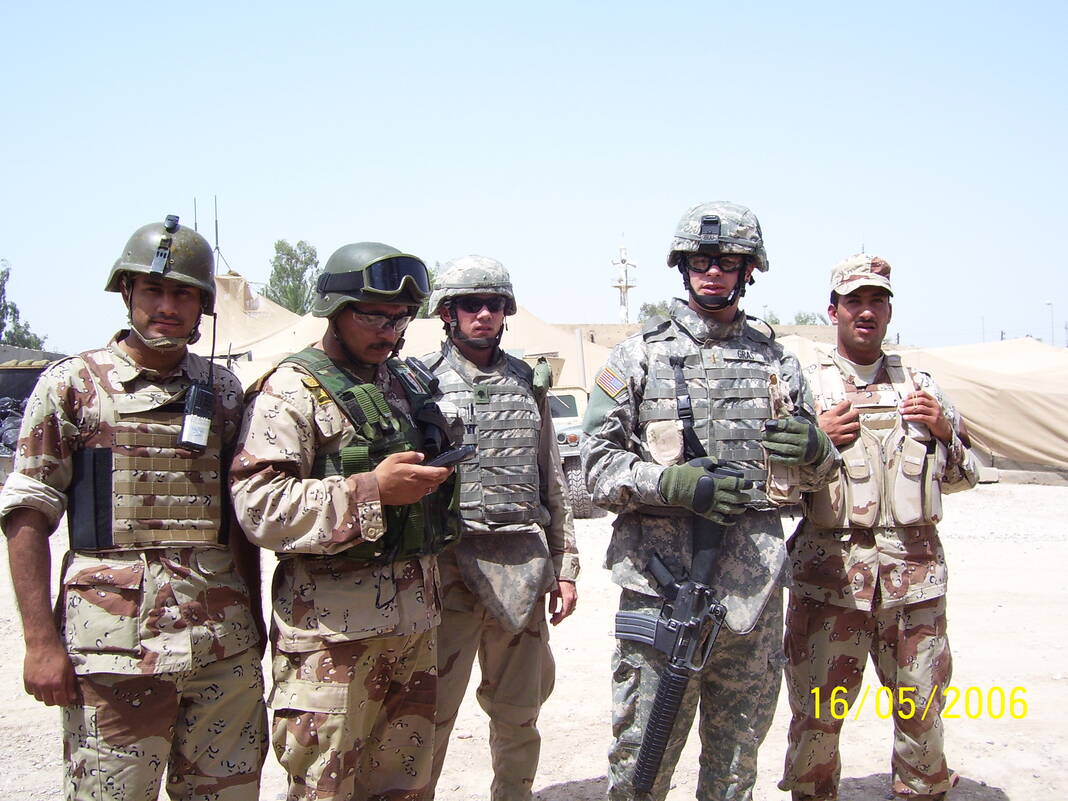
Brown County native and veteran Samuel Gras now manages international security and crisis management at Boston College.

Gras visiting his friend from the Army Colby Umbrell’s memorial. Losing Colby was one of the catalysts that made Gras pursue a different career path.

Gras in Iraq in 2006 surrounded by his Iraqi partners
Boston College’s Chair of the Global Travel Committee Samuel Gras is responsible for international travel and global security for students, faculty and staff at Boston College while studying abroad. He is also a Brown County native.
Gras told the Democrat that Boston College has around 4,000 students traveling each year. He is responsible for monitoring global security and is alerted for national emergencies in countries where Boston College has travelers. Once he receives notification of an emergency, he will contact the students in the area for overall wellness checks, support and information. He will also provide contacts and facilitate security evacuations for severe enough cases. Gras notifies the Communications Department of the college when there are global emergencies, and they contact the media.
Gras told the Democrat that he was a part of the team that evacuated 52 students, faculty and staff members from Ecuador in January. They were in Ecuador during winter break for various immersion programs. Because of rising gang violence, the Ecuadorian President Daniel Naboa declared an internal armed conflict, closing schools and businesses. Boston College decided to evacuate students because of the unsafe political climate. Gras’ team coordinated activities for the students and facilitated their early departure.
He said that his position sometimes requires him to travel with little warning to countries to facilitate on-the-ground and provide whatever assistance is necessary. Gras was sent to Chile for a faculty-led program after the faculty member became incapacitated and was unable to continue the program. He was in Chile within 40 hours of being notified and was responsible for stabilizing the situation, managing the excursions and even finishing the program. He said that the military prepared him for many aspects of his career like accountability, analysis, communication and the 24/7 nature of constantly working.
International crisis management is a fairly new position within universities. It started around 10 years ago after rising concerns for terrorist attacks in Europe and natural disasters like earthquakes and hurricanes in other parts of the world.
Gras graduated from Brown County High School in 1994 and studied at Indiana University until he graduated in 2000.
“At IU I did international studies and history and I graduated in 2000, pre- 9/11,” Gras said. “I studied international security … When 9/11 happened, I thought that was my topic and I really wished I could have done something to help, so I joined the Army.”
Gras was deployed to Iraq in 2006 and was later promoted to Captain. In Iraq he worked with the Sunni people. He said that once the war started, they were very much on the outside so his team was there as peacemaker between the Sunni and surrounding people. He also worked with the locals to target who was good and bad in the area.
“Roadside bombs were really bad then so we lost 17 people from my unit,” Gras said. “We didn’t get into any traditional battles, it was mainly the roadside bombs. I loved the work and the uniform but it kind of wears on you for a while, so I decided to try something else.”
Gras told the Democrat about the cognitive dissonance he faced when traveling to Europe for the first time on his military leave. During his week off for leave, he flew to Slovenia to visit his girlfriend who was enlisted in the Slovenian Miltary. He recalled how difficult it was being in Iraq one week and on a relaxing vacation the next. He said that even though he was in a serene European country, he knew he had to return to war. Gras said that during his time abroad he kept tabs on his hometown and even read the Democrat to keep up with the local news.
“When in Iraq, I would read the Sheriff’s log with my friends to still have that little small town connection,” Gras said.
He said that when he was young, he experienced the wonderlust of wanting to get out of his hometown, but once he left he missed the familiarity of his favorite places or the ease of running into acquaintances on the street.
“Traveling so much takes energy, and with flights and moving around, meeting new people and support groups takes effort,” Gras said. “I miss having someone you can call if your car breaks down, or having small talk with someone in a coffee shop. You miss that friends or family aspect (of small towns).”
After receiving the news of the loss of his friend Colby Umbrell in the Army, and a mission that went awry leading to a sniper incident, Gras said that he decided it was time to try something new. Once his tour was over, he got married in Slovenia and decided to pursue a second career, one that still involved international security and risk management. He said that while he does not have Post Traumatic Stress Disorder from the war, he feels that his PTSD is more related to the guilt that he felt leaving the war before it was over. He said he struggled with the feeling that he did not do enough and that he should have continued on in Afghanistan.
Gras said he constantly wonders what his life would be like if he would have stayed in the military and has many friends who are still enlisted. However, he said he enjoys that his new career allows him to still serve people and gives him a sense of purpose.
Gras said that while there were very bad things that happened in the war, his personal experience allowed him to have many positive moments as well. He said that he knew he did his part and can say that he did good things during his time in Iraq.
“When you got back, people didn’t want to talk about it,” Gras said. “For my little part of it, I feel I did a good job and had a lot of good friends. I was surprised no one asked about it. There were a lot of protestors against it, it was out of sight out of mind. One misconception people think is ‘Oh they don’t want to talk about it’. It’s a big experience and I think it’s healthy to talk about it. If you bury it down you don’t really get to have that healthy healing. I was surprised nobody was more interested. I was doing intel work, we were in a pretty hot area. I was drinking tea with these tribal leaders, I had a lot of interesting experiences.”
Gras said that he was very lucky to have met and worked with the people they lost in the war.
“I’m glad to have known them, they were not just number on a screen, they were individual people with families,” Gras said. “You learn the gravity of war by knowing people who didn’t make it home.”
Gras said once he was out of the military and married to his wife, they moved to Italy because she was based there for a NATO project and lived there for three years. Gras returned to the United States to attend graduate school in both Montgomery, Ala. and Monterey, Calif. He began working at Oregon State University in crisis management and moved to Boston after the pandemic.
He does not know where they will be moving next, but one of his goals is to return home one day.
“I’ve always dreamed about moving back to Brown County. Do my adventures and then go back to the hometown life,” Gras said. “I’ve idealized and dreamed about it. All the great stories, you want to return home after the war. Home is home.”

